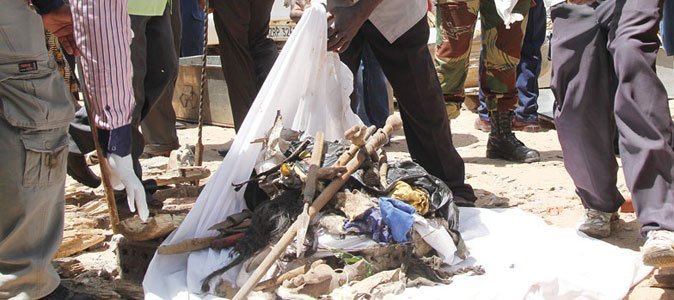
THE mysterious blast in Chitungwiza last week once again raised the question whether Zimbabweans are enslaved by superstition and witchcraft.
REPORT BY NQABA MATSHAZI
Five people, including a traditional healer and a businessman, died in the blast.
Before the police had made any headway in their investigations, several theories were already gaining traction.
The most popular being that the blast was caused by “lightning” created by the traditional healer.
The other theory was that the slain businessman was trying to get rid of a goblin, while another said he wanted a potion to make him more successful.
But while the full story is still to be told, the way Zimbabweans were quick to blame the blast on a supernatural act is cause for concern.
There are indications that the blast could have been caused by an anti-tank mine.
- Chamisa under fire over US$120K donation
- Mavhunga puts DeMbare into Chibuku quarterfinals
- Pension funds bet on Cabora Bassa oilfields
- Councils defy govt fire tender directive
Keep Reading
Catholic priest Oskar Wermter argues that superstitions and witchcraft are a form of “escapism” for people who cannot explain their circumstances.
“It is a matter of looking for a scapegoat and blaming other people for one’s failures,” the clergyman said. There are several such cases where people fall back on superstition.
Another story that caught the imagination of many was the underwear-raiding goblin of Gokwe. The goblin was reported to have been stealing women’s underwear while they slept and dumped the garments at a secluded area near the village.
But the most popular superstition should be “ngozi” known as avenging spirits, particularly for a person who dies in unclear circumstances.
Traditionalists believe that to appease the avenging spirits one should pay restitution or sacrifice a beast otherwise they will never know peace.
The most high-profile case was probably that of Midlands Governor Jason Machaya, where he had to pay a hefty penalty to appease a man whose son had been beaten to death by the governor’s son and three others.
Tavenga Chokuda, the father of the dead man demanded a young woman, US$15 000 in cash and 70 head of cattle before he could bury his son.
The son’s remains spent two years in the mortuary.
Chokuda warned that if his demands were not met, his son’s vengeful spirit would haunt his killers and their families. Fearing the supernatural ve-ngeance, Machaya coughed-up.
Strangely, most of those convicted for the murder died in prison in bizarre circumstances.
But opinion is divided among ordinary Zimbabweans on superstition and witchcraft.
A number said their Christian beliefs meant that the only supernatural things they believed were miracles from God.
“There is nothing like witchcraft,” said Memory Shumba, who described herself as a devout Pentecostal. “People just make up stories and only God can have such powers.”
Zibusiso Moyo, a student at the National University of Science and Technology said witchcraft could not be explained scientifically, making it hardly plausible. Cultural activists back spiritual beliefs
Another high-profile case of superstition was that of mermaids that were said to be “blocking” the pumping of water at a dam in Gokwe and Mutare last year.
Water Resources Development and Management minister, Samuel Sipepa-Nkomo later told a parliamentary committee that workers had abandoned their stations vowing not to return unless the mermaids were appeased.
Sipepa-Nkomo suggested that a troupe of traditional healers and leaders should be dispatched to the dam to perform rituals to appease the edgy mermaids.
The minister’s theory seemed to have the backing of several cultural activists including Peter Zwide Khumalo, a descendant of King Lobengula, who said mermaids played a central role in spiritual beliefs.
“As a custodian of the tradition I have no doubt,” traditional leader chief Edison Chihota said of mermaids. “For anyone to dispute this is also disputing him or herself.”
But were the engineers not just blaming it on mermaids after having failed to do a job they were trained to do?
‘Witchcraft real cannot be wished away’
Tinotenda Shumba said witchcraft was real and could not be wished away.
“Even those who believe in God cannot explain miracles, in the same way that witchcraft is inexplicable,” she said. “But witchcraft and superstition are part of us and we cannot wish them away.”
People from all walks of life are trooping to Emmanuel Makandiwa’s United Family International and Uebert Angel’s Spirit Embassy where the two claim to have supernatural powers to heal the seek and create instant wealth for the poor.
Surprisingly, they still ask the poor to contribute tithes to their churches.
Wermter said witchcraft and superstition were an easy refrain, once one has a problem he or she blames it on the most unpopular person in the community.











